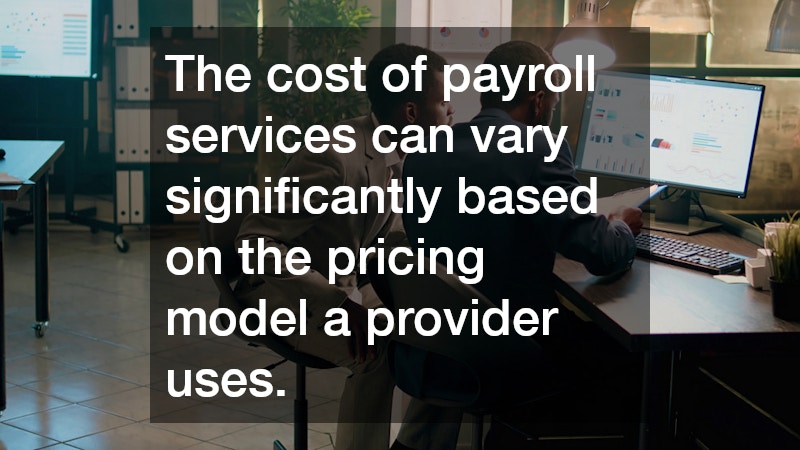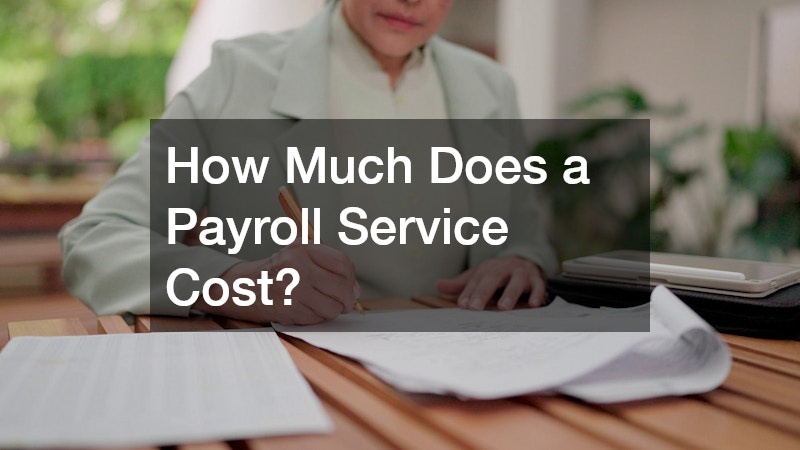
Payroll services are essential for businesses of all sizes to manage their employee payments efficiently. These services ensure that employees are paid accurately and on time, which helps maintain goodwill and trust in the organization. Furthermore, payroll services help companies comply with various tax regulations and labor laws, reducing the risk of incurring penalties.
Cost is a critical factor for businesses when deciding to use a payroll service, and understanding these costs can help businesses budget appropriately. In this article, we will explore the various factors that influence the cost of payroll services and what businesses can expect to pay.
When companies consider utilizing payroll services, they often analyze their needs and the capabilities of the service provider. Payroll services can vary widely in terms of features, customer service, and overall cost. By understanding the different options available, businesses can select services that align with their specific requirements. The choice of a payroll service often depends on the size of the company, the complexity of its payroll, and whether it prefers outsourced or in-house solutions. Recognizing these elements is crucial for any business decision-maker looking to optimize their payroll process efficiently.
Many businesses face challenges related to payroll management, such as wage calculations, deductions, and tax filing. Employing a payroll service can alleviate these burdens by offering specialized expertise and software solutions tailored to meet these needs. These services provide more than just payment processing; they often include comprehensive reporting, employee self-service portals, and direct deposit options. By streamlining payroll operations, businesses can focus more on their core activities, driving growth and operational efficiency. As these benefits are realized, understanding the associated costs of payroll services becomes even more significant.
Diverse Pricing Models in Payroll Services
The cost of payroll services can vary significantly based on the pricing model a provider uses. Common pricing models include per employee per month, flat monthly fees, or a combination of fixed and variable costs. Each model has its advantages and disadvantages, depending on the size and structure of the company. For small businesses, a per employee per month model might offer more flexibility and control over expenses. Conversely, a flat monthly fee could benefit larger organizations with a more stable payroll size, making cost projections easier to handle.
Another factor influencing payroll service costs is the level of service a business requires. Basic packages often cover standard payroll processing features, while higher-cost options may include additional services like time tracking or HR support. Enhanced packages can be beneficial for companies needing more than just payroll management, especially if they require comprehensive solutions. The choice between standard and premium services depends on a company’s specific operational needs and its willingness to invest in additional functionalities. Businesses must evaluate whether the extra features justify the extra cost in line with their strategic objectives.
Hidden fees and additional charges are common considerations when evaluating payroll service costs. It is crucial for businesses to scrutinize contracts for potential extra costs like setup fees, year-end tax services, or fees for running off-cycle payrolls. Transparency in pricing helps businesses avoid unexpected expenses and ensures they are making informed financial decisions. Adequately understanding these potential charges can prevent future disputes and enhance the relationship between the business and the payroll service provider. Taking the time to compare pricing structures is essential for businesses aiming to achieve cost-efficiency.
Factors Affecting the Cost of Payroll Services
Several key factors contribute to the cost of payroll services, including the complexity of the payroll tasks and the level of customer support provided. Complex payroll requirements, such as multi-state tax filing or managing garnishments, may entail higher service fees. Moreover, businesses with a high volume of transactions or special payment cycles might experience increased costs due to the additional workload on the provider. Providers offering 24/7 customer support or dedicated account managers might charge more due to the personalized service and quick resolution times. Understanding these factors can help businesses determine which aspects are essential for their operations and how much they are willing to budget for them.
Technology and automation levels are also significant contributors to varying costs in payroll services. Providers using advanced technology often offer faster processing times, enhanced accuracy, and detailed analytics, which can justify a higher price point. Automation tools reduce manual error and streamline operations, which is particularly valuable for businesses handling large payrolls. A cutting-edge technology stack can provide a competitive edge, allowing companies to focus on strategic business initiatives rather than administrative tasks. However, businesses should evaluate whether the benefits of such technology align with their operational goals and budget constraints.
The geographical location of the business can impact payroll service costs as well. Companies operating in regions with different wage laws or employment regulations may require more complex solutions, influencing the overall pricing. Additionally, regional economic conditions might affect pricing models, with some areas offering more competitive rates than others. Businesses should consider regional differences when deciding on a payroll service provider to ensure compliance and cost-effectiveness. This geographical consideration can help tailor payroll solutions to unique regional needs and ultimately enhance organizational efficiency.
Choosing the right payroll service is a crucial decision for any business, affecting both operational efficiencies and financial performance. A thorough understanding of the different cost structures, factors influencing pricing, and your business needs can help ensure the best fit. Evaluating the return on investment from the payroll services ensures that the chosen solution aligns with your company’s goals and budgetary constraints. Achieving the right balance between cost and service quality can enhance productivity and enable businesses to focus on their growth strategies. Ultimately, informed decision-making in payroll service selection is indispensable for sustainable business success.
Businesses should consider engaging in an in-depth comparison of potential payroll service providers before making a commitment. Comparing reviews, obtaining quotes, and requesting trial assessments can be vital steps in the selection process. Assessing a provider’s reputation and customer feedback can provide insights into their reliability and service standards. Partnering with a trusted and competent payroll service can yield long-term benefits, from streamlined administrative processes to compliance with legislative requirements. As the payroll service landscape evolves, it remains critical for businesses to stay informed and adaptable to secure the most strategic solutions.
Understanding payroll service costs involves more than just evaluating the numbers; it requires a comprehensive analysis of various business and market dynamics. By factoring in service packages, technology, geographical considerations, and hidden fees, businesses can make informed, strategic decisions. Focusing on cost-effectiveness without compromising on essential service quality ensures operational excellence and sustained competitiveness. Ultimately, by aligning payroll solutions with business priorities and requirements, companies can enjoy enhanced financial management and operational coherence. Cost-effective and tailored payroll services are vital enablers for advancing business success and achieving long-term growth objectives.




